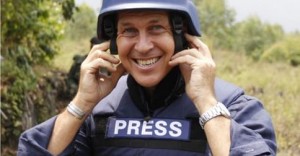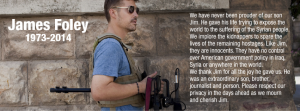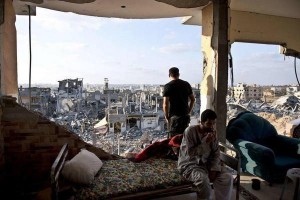
Peter Greste in the field. Image via FaceBook.
The United States ranks 46th in the world for press freedom. The Obama Administration has cracked down on more whistleblowers and journalists through prosecutions and investigations for stories they don’t like, using national security issues as an excuse.
The Department of Justice is being used to facilitate this crackdown. What is the message we are sending the rest of the world? That it is okay to do this to journalists and citizen reporters. Yet we wonder why Egypt feels justified for imprisoning international journalists for telling both sides of a story. We are horrified when press people are targeted, and the added atrocities of murder only add to the confusion.
Meanwhile, we live in a world where 50 MILLION people are currently living in refugee conditions. The conditions are so widespread, many international communities have become desensitized to the real issues. As we observe that the majority of humanity desires the same thing – an opportunity for a secure, healthy, educated life for their children – we can not help but wonder why this seems so remote of an idea.
Would you rather NOT know about the troubles in other countries? Would your future seem brighter if you did not know all you know now? Do you think it is acceptable for people to die in the course of reporting the news, with no one reporting their death?If it were your city being attacked, your neighborhood being invaded, or your home being seized by an enemy, wouldn’t you want someone, somewhere, to report it?
If you consume the news, national or international, you owe the reporters that bring you that news your solidarity. Without them, you would be in the dark. You would not know that Russia had taken Crimea and continues to threaten stability in Ukraine and across Europe. You would not know that Daesch is storming across the Middle East, threatening Muslims, Christians, all minorities, all women, all children, and wishes to do the same to anyone who does not agree with their misguided interpretation of religion. You would not know that a city on the Syrian-Turkey border has been in a month-long war to prevent the slaughter of the remaining residents there, while Turkish troops prevent additional fighters wanting to go help defend the city.
The Frontline Club is one of the world’s most prestigious media organizations that promote the message and ideals of a free and responsible world press. Set up by Vaughan Smith in 2003 in honor of colleagues at the Frontline News Television agency who died pursuing their work, the Frontline Club quickly became a center for a diverse group of people united by their passion for quality journalism and dedication to ensuring that stories that fade from headlines are kept in sharp focus. It exists to promote freedom of expression and support journalists, cameramen and photographers who risk their lives in the course of their work.
On Thursday, October 16th, 2014, the Frontline Club hosted their annual awards ceremony. The keynote speech was particularly special, coming for the first time from an imprisoned journalist. Please read this most important message, and consider its meaning the next time you consume news.
Ladies and Gentlemen,
Tonight is, I know, a moment to celebrate the very best of our craft, to honor those whose work represent the standards and values that draw the admiration and respect not just of our peers but also the public, and that we can all point to in arguments about why our industry really is essential to a proper functioning democracy.
But this evening’s gathering also comes soon after the horrific executions of James Foley and Steven Sotloff by the Islamic State in Syria, and so before I talk about the awards, I’d like to take the opportunity to pay my respects to them and reflect on the state of journalism more broadly.
Both James and Steven paid the ultimate price for working in an industry increasingly reliant on brave, committed freelancers. They occupied a space where risk-averse news organisations are increasingly outsourcing coverage itself.
Of course the extremists who murdered them weren’t concerned about who they worked for. What mattered was that they were journalists, and that they were westerners. And in those respects, they represent a shocking example of a broader state of affairs faced by thousands of journalists around the world.
Rarely have so many of us been imprisoned, beaten up, intimidated or murdered in the course of our duties. In my cell in Masraa prison in Cairo, I don’t have access to the latest figures, but an editorial in The Times that I saw quotes the sums that Freedom House put together for last year. In 2013, 71 journalists were killed on the job. Eight hundred and twenty six were arrested, 2,160 were physically attacked and 87 were kidnapped. And those numbers don’t include the fixers who are often more exposed than us reporters who hire them, or the citizen journalists who are often the only sources of information in a place like Syria.
Heaven only knows what the numbers are like this year, with Syria, Iraq, Gaza and Ukraine helping to drive them north. As of May (2014? PG does not state the year) more than 60 reporters had died in Syria alone and more than 30 had been kidnapped. And that’s before the killing of James and Steven.
Globally, Freedom House says that press freedom is the worst it’s been in a decade. It reckons that 44 percent of the world’s population lives in places where the media is ranked as ‘not free’, while 42 percent are in regions where the media is said to be only ‘partly free’.
A few years ago Barrack Obama addressed a special joint sitting of Australia’s parliament, and in his typically grand, sweeping style, he declared that the ‘currents of history ebb and flow, but over time they move decisively in a single direction’ . History, he said, ‘is on the side of the free – free societies, free governments, free economies, free people’.
But if that is true, why are times so tough for those of us working at the sharp end of the fourth estate? After all, our industry is supposed to underpin that inexorable march towards liberty and democracy. I don’t know of any politician who openly declares that the world would be better off with a meek and compliant press, and yet the disturbing figures tell a very different story.
I may not have an academically researched hypothesis, but as you’ll appreciate, I’ve had a bit of free time to think about this. It seems to me that at least part of the problem is the changing nature of conflict itself, and it’s driven in particular by that atrociously named ‘war on terror’. And the name itself I think goes a long way towards explaining why we are in this situation.
Throughout most of the past four decades, wars have been dominated by struggles over tangible things like territory or resources or ethnicity. Even some of the conflicts over competing political ideologies such as Colombia’s civil war between leftist rebels and a right-wing government were, in truth, struggles for control of land.
Those of us who’ve covered that messy, complex conflict, or other local wars like the battle for resources in Eastern Congo or political and ethnic power in South Sudan will know that the biggest risk comes from random bits of flying metal or a drunk soldier at a checkpoint, rather than an attack aimed specifically at journalists. It’s risky of course. But the dangers are usually incidental, from working in an inherently violent environment rather than in a place particularly hostile to journalists.
Even in the early days of the Arab Spring, when I’d argue that the fighting was over one of the most valuable resources of all – political power – journalists were rarely directly attacked. And plenty of news organizations were able to place teams on both sides of the lines and cover the crises with a degree of balance and neutrality.
Of course propaganda is as old as war itself, and warring factions have always sought to control the narrative of a conflict. But in these wars over stuff, the target has generally been the message rather than the messenger.
But this brings me back to the War on Terror – a conflict that by its very nature is indefinable, with no clear physical or ideological boundaries; and with a title that means everything and nothing. Or rather, it means whatever any of the groups involved want it to mean.
This is, in a way that we’ve rarely seen in the past, a struggle over ideas and ideologies. It’s a battle between competing world views much more than a fight for land or minerals. And in this struggle, the message is as much a weapon as any gun. Witness the way Islamic State has used YouTube to recruit its supporters and terrify its opponents.
The trouble for us journalists is that there is no neutral turf, no safe ground from which to report. As much as we abhore and condemn the executions of James and Steven, it was George Bush who set the ground rules in the wake of 9/11 when he declared that you’re either with us or with the terrorists. That single statement made it impossible for reporters to hold to the principles of balance and fairness without being accused of acting as an agent for the enemy.
Al Jazeera learned that to its cost when the US hit its offices in Baghdad during the invasion to oust Saddam. And in Afghanistan one of its camermen, Sami al Haj, was arrested. He spent seven years in Guantanamo Bay before being released without charge.
Since the War on Terror began, all manner of abuse of journalists and attacks on human rights and priess freedoms have been excused as necessary evils, and by governments across the globe. It almost feels like a kind of globalized McCarthyism, where simply invoking terrorism is enough, in some cases, to get away with murder.
I do not mean to minimize the risks of terrorism, or blame governments alone. The Islamic State’s executions are simply the latest and most shocking examples of the problem on the other side of the ledger.
The roll call of victims is sobering indeed. From my old friend Maria Gracia Cutuli, an Italian magazine writer and the group of freelance and agency journalists she was traveling with, who were among the first to be murdered by the Taliban in Afghanistan after 9/11, to the Wall Street Journal reporter Daniel Pearl; to the BBC’s Simon Cumbers gunned down in Saudi Arabia and Frank Gardiner who survived the attack, to another BBC friend and colleague Kate Peyton killed in a drive-by shooting in Mogadishu; and the Channel 4 News cameraman Martin Adler who died there the following year; and on to the latest victims. These are just some of the more high profile casualties of the conflict, and in this relatively small community I’m willing to bet that only a handful of people here tonight have more than one or two degrees of separation between themselves and someone who’s been killed, wounded or imprisoned. We all know someone, or know someone who knew one of them.
My point is that in all of these battlegrounds, whether hot or cold, journalists are no longer on the front lines. We are the front lines. In this wider conflict, there is no such thing as a neutral, independent reporter. In the view of both sides, if you cross the lines in pursuit of our most fundamental principles of balance, fairness and accuracy, you effectively join the enemy.
The compelling world views seem so widely divergent that to even try to understand the other side is to commit what many governments now consider to be treason.
So, where does this leave the future? Well, I don’t think it’s hopeless. At a personal level, our incarceration in Egypt – myself and my two Al Jazeera colleagues Mohammed Fahmy and Baher Mohamed – and more crucially the Foley and Sotloff murders have dramatically reminded people why a free and untramelled press is so important. People might not always like everything they see in the media, but they recognize the intrinsic value of ethical, professional reporting and instinctively balk at anything that limits it.
I’ve been staggered by the incredible number of people who’ve supported our cause, not so much because they see an injustice, but because they see an attack on press freedom.
In one of the letters that made it through the prison gates, one woman wrote to gleefully remind me of those surveys we see often that rank journalists somewhere between used car salesmen and abattoir workers in terms of social status. But then she went on to write ‘I also know that fearless and frank journalism as practised by true professionals is what keeps our treasured democracy so strong’.
The key phrase here is ‘true professionals’. People recognize shabby, partisan journalism when they see it, but at times of crisis, they still turn on the news or go to the websites of their most trusted news organization.
The hunger for reliable news and the recognition of the role it plays in a healthy, functioning democracy is still there, but we can’t take public support for granted. That’s why I’m convinced that our best strategy as an industry starts with a rock solid commitment to our core ethical and professional standards. The more sloppy we get, the more we degrade public support for our business, the more excuses we give to governments to limit and control what we do.
This is far more than an abstract idea. This is very much about our own security as individual journalists.
Take our case as an example. I am incredibly proud and humbled by the extraordinary wave of support that we’ve been getting from around the world – from human rights groups, from politicians and diplomats but also, crucially, from a huge chunk of the public as well.
As I said, much of that has been in response to the principles they’ve seen violated, but I am also convinced that if any of us had stained professional reputations, our accusers would have hailed it from the roof tops, and our support would have crumbled to dust. Our political champions would have walked away and we’d be seen as victims of our own shabby standards.
We are still in prison of course, but I am still certain that if and when we are finally released, that global support, will be what ultimately saves us.
There is also one other source of backing that I want to spend a few moments on, that has been both crucial and I suspect somewhat unprecedented.
Even at the very best of times, we journalists are a fractious lot. We are argumentative, skeptical and fiercely competitive. I suppose those are the qualities that drew most of us into this business in the first place but they are also traits that make us notoriously hard to organise. And yet . . . it feels as though our entire community has set aside its instincts and swung behind us in a solid, unified block.
We’ve seen letters co-signed by fierce rivals, the zip-lips campaign which has seen our colleagues from around the world post selfies with their mouths taped shut including, I’m sure, more than a few people in this room. There have been persistent questions in news conferences, notes of support to us in prison and of protests to the authorities. In short, there has been a unity of purpose that not only inspires and strengthens us, but I believe sends a powerful message to any politican considering a clamp down on the press.
Taken together this outpouring of political and public support has helped reignite a crucial debate about the relationship between governments and the media; or more correctly, between a free press and a free society.
Whether people are aware of it or not, I’d like to think that most would agree with Albert Camus who said that, “A free press can, of course, be good or bad, but, most certainly without freedom, the press will never be anything but bad.”
Ladies and Gentlemen, I’ve not had an opportunity to see any of the entries for tonight’s awards, but I know that to have made the short list, the work you will see will, by any definition, be amongst the best independent journalists can deliver. I know without seeing it, that it will be courageous, revealing and inspired. I also know that it will be the kind of work that reminds our readers and audiences why a free press really does matter.
Thank you.
This speech was put together by Peter Greste’s family after speaking with him over a number of fortnightly prison visits.


![By Muhamed ashraf (Own work) [CC-BY-SA-3.0 (http://creativecommons.org/licenses/by-sa/3.0)], via Wikimedia Commons](http://occupyworldwrites.org/wp-content/uploads/2014/06/Great_pyramids-300x191.jpg)



![Photo By Brendon Connelly from Newberg, Oregon (Quesadilla and light reading) [CC-BY-SA-2.0 (http://creativecommons.org/licenses/by-sa/2.0)], via Wikimedia Commons](http://occupyworldwrites.org/wp-content/uploads/2014/04/1024px-2010_reading_newspaper_5212998986-225x300.jpg)
![Anti-Morsi protests in Tahrir Squre in June, 2013. Morsi was removed from office in early July. Photo By Muhammad Mansour [CC-BY-2.0 (http://creativecommons.org/licenses/by/2.0)], via Wikimedia Commons](http://occupyworldwrites.org/wp-content/uploads/2014/03/Anti-Morsi_protests_June_2013_in_Egypt-300x300.jpg)
![Pro-Morsi supporters in Muslim Brotherhood rallying point outside Rabaa al-Adawiya mosque in Cairo, July 11, 2013. Photo By VOA/Sharon Behn [Public domain], via Wikimedia Commons](http://occupyworldwrites.org/wp-content/uploads/2014/03/Pro-Morsi_supporters_outside_Rabaa_al-Adawiya_mosque_Cairo_11-July-2013-300x211.jpg)